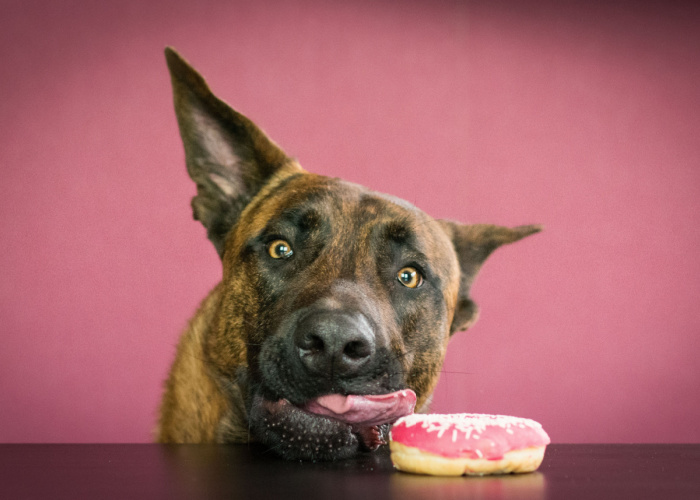
Table of Contents
Can dogs eat donuts? Are they safe for my dog?
Donuts are considered a delicious treat for many people.
Since when are donuts not a favorite? They are sweet and have many different types and flavors!
That said, you might be thinking of sharing it with your furry friend but wondering if it’s safe.
Donuts are cooked in unhealthily processed oils and are rich in sugar and fat.
It can be toxic to your pooch if he consumes high amounts of these ingredients.
According to WebMD:
Too much sugar can do the same thing to dogs that it does to people. It can make your dog overweight and cause problems with their teeth. It can even lead to diabetes.
If your dog just ate donuts, this article will answer your question about whether dogs can eat donuts.
We’ll help you know the most toxic types of donuts, the dangers, and what you can do.
Let’s get started!
Here’s a quick navigation:
- Can Dogs Eat Donuts?
- Why Are Donuts Bad For Dogs?
- Dangerous Ingredients For Dogs in Donuts
- What Should I Do If My Dog Ate A Donut?
- What Happens if My Dog Eats a Donut?
- What Will My Veterinarian Do?
- FAQs
Can Dogs Eat Donuts?
Are donuts bad for dogs?
Our dogs can generally eat donuts without any problems.
But as a general rule of thumb, you shouldn’t share donuts with your furbaby if you want to preserve his health.
Donuts contain a lot of calories, fat, and carbs, all of which should be avoided.
Every fur parent should also be informed of additional possibly toxic ingredients present in them, which you'll discover in the next section.
But keep in mind: even if the donut is plain and free of toxic ingredients, we still do not advise giving it to your dog.
But he looks okay, and nothing weird is going on.
Perhaps he took one from the counter without your knowledge. Well, accidents do happen.
In most situations, a modest amount won't harm your dog.
However, things would have turned out differently if you had been giving it to him as a treat.
Still, donuts have few nutritional benefits and are high in calories, so we shouldn’t share them even in small amounts.
Even though it's difficult, try to ignore the puppy-dog stares!

Why Are Donuts Bad For Dogs?
The risk of pancreatitis and obesity increases if Fido consumes a lot of sugary foods, such as donuts.
Since dogs have trouble digesting fat, deep-fried donuts may also cause them to experience indigestion or diarrhea.
They will want more if you give them one bite. It's simply best to avoid giving your dog any of your donuts.
RELEVANT READ: Pet Obesity: Is Your Dog Adding to the Statistic?
Dangerous Ingredients For Dogs in Donuts
Who would say no to donuts with their favorite add-ons? (Definitely not me!).
Donuts with chocolate toppings or fillings and covered in glaze or powder are the best ones.
They are both sweet and slightly umami-flavored since they were deep-fried in oil.
So, if you enjoy them, make sure your pooch won’t see them!
When you give these extras to your dog, they'll likely negatively affect their health.
Also, eating donuts may be harmful to dogs who already have underlying medical conditions.
Sugar
Donuts have a lot of sugar in them.
A little bit of sugar every now and then won't harm your woofer, but if they consume it frequently over time, they will develop health problems.
This includes all forms of sugar:
- Cane sugar
- Brown sugar
- Processed sugar
- Powdered sugar
Weight gain from added sugar's empty calories can increase our dogs' risk of developing health issues like:
- Osteoarthritis
- Skin problems
- Cushing’s disease
- Congestive heart failure
- Intervertebral disk disease
- Cruciate ligament ruptures
SUGGESTED READ: Congestive Heart Failure in Dogs: What to Expect and Do
Chocolate
Probably the most well-known ingredient to be poisonous to dogs is chocolate.
The main toxic component in chocolate is theobromine.
According to Animal Emergency Service, our dogs cannot digest theobromine as quickly as we humans can.
This substance can cause vomiting and diarrhea as well as damage to the nervous and cardiovascular systems.
It can lead to seizures and possibly death at excessive doses.
That means the more chocolate and theobromine a dog consumes, the more severe their symptoms will be.
The symptoms of chocolate poisoning in dogs include vomiting, diarrhea, panting, pacing, and increased thirst.
Tip: The more bitter or darker the chocolate, the more harmful it is to dogs.
RELATED: Why Is Chocolate Bad for Dogs?
Xylitol
Artificial sweeteners are used in some donut recipes in place of or in addition to normal sugar.
Xylitol, the most popular artificial sweetener, is extremely toxic to our dogs.
According to Caroline Coile, AKC Family Dog Nutrition & Health columnist:
“The dog’s pancreas confuses xylitol with real sugar and releases insulin to store it. The insulin removes real sugar from the bloodstream and the dog can become weak, and have tremors and even seizures starting within 30 minutes of eating it.”
As a response, the blood sugar levels fall dangerously low, resulting in issues like tremors, seizures, and collapse.
Fact: Xylitol toxicosis has only been documented in dogs among domesticated species.
Fillings
But there are so many flavored fillings of donuts. Which among them are toxic?
Most of them contain a lot of sugar and artificial sweeteners.
Xylitol, which can result in dog food sickness, can be found in fruit fillings and chocolate ganaches.
Modern bakers employ various ingredients to make donut fillings, but grape-based preserves are also widely used and dangerous for dogs.
Toppings
Toppings on donuts can hurt your canine companion just as much as the fillings do.
Some toppings for donuts, like peanuts, are OK for our dogs to eat.
However, some toppings, such as raisins, pecans, almonds, macadamia nuts, and chocolate chips, are harmful.
These foods are clearly hazardous to dogs and, if consumed in greater quantities, might be fatal.
RELEVANT READ: Can Dogs Eat Macadamia Nuts? Benefits and Side Effects

What Should I Do If My Dog Ate A Donut?
Unpleasant situations can arise when you witness your woofer eating something bad.
As a fur parent, quick decision-making and suitable action are crucial in such dangerous situations.
Simple measures to help your dog are as follows:
1. Stay calm
The first thing you need to do is to remain calm.
I know this is frequently easier said than done, but you will think more logically if you are calmer.
Bear in mind that dogs are also sensitive beings. Fido will notice your anxiety right away, which will only make things worse.
2. Remove the donuts
Pick up any remaining donuts right away, or take your dog and confine him in another room.
When they are caught in the act of committing a crime, as in this instance, eating donuts, they often start eating even faster.
So it's important to throw away any leftover donuts.
3. Assess the situation
After you’ve isolated your dog from the leftover donuts, try to analyze how much your dog ate, as well as their ingredients.
Most of the time, the ingredients are found on the packaging.
If this information is missing from the box, it could be a good idea to phone the donut shop and ask for it.
4. Call your vet
Call your vet and explain the situation.
Provide him with as much information as possible.
It will be simpler for your vet to offer advice and additional instructions the more information they have regarding the situation.
5. Follow your vet’s instructions
Depending on your Fido’s size and the type and amount of eaten donuts, the vet may advise waiting to see how things play out.
It's critical to pay attention while listening and to do what you're told.
6. Do not self-treat
Self-medicating for your dog friend in defiance of the vet will never be a wise idea.
Never administer human medications to your dog, as many of them are dangerous.
In addition, unless your vet instructs you to do so, avoid attempting to induce vomiting.

What Happens if My Dog Eats a Donut?
A dog will usually be alright if it consumes a donut in smaller quantities.
Your dog should be safe, barring any contact with potentially toxic ingredients like chocolate, some nuts, and artificial sweeteners.
However, eating more donuts can upset their stomach and make them throw up and have diarrhea.
Small dogs with delicate stomachs are particularly susceptible to this.
These symptoms are frequently minor, but if they last more than a day or two or become bothersome, you should see your vet.
Can Dogs Eat Donuts: What Will My Vet Do?
How quickly you can get your dog to the vet will determine the treatment.
The vet may give medication to treat your dog if you can get them there in the early stages of poisoning.
Additionally, he can administer activated charcoal to your dog, which will aid in preventing theobromine from being absorbed into your dog's system.
It could be necessary to pump your dog's stomach if the poisoning is already severe.
Following the active charcoal therapy, your vet will also administer fluids and IV medications.
Can Dogs Eat Donuts: FAQs
Can dogs have krispy kreme donuts?
All donut varieties made for us are off-limits to dogs. Since they are more sensitive to sugar, even a small amount can result in health problems.
Krispy Kreme donuts have a lot of poisonous ingredients like nutmeg and chocolate.
The ingredients are usually listed on the Krispy Kreme packaging, so it is much simpler to figure out what they ate.
Can dogs eat dunkin donuts?
Dunkin Donuts should be off-limits to dogs.
Any processed foods with sugar and dubious ingredients that are not intended for them should not be anywhere near your dog.
If given in big quantities, Dunkin Donuts might have mild to major negative impacts on your furbaby’s health.
Can dogs eat glazed donuts?
No, dogs should not have glazed donuts.
They are highly sugary, high in fat, and have poor nutritional value.
Some other varieties of glazed donuts may also include xylitol, an artificial sweetener that is poisonous to dogs.
Can dogs eat powdered donuts?
No, dogs should not eat powdered donuts. They can harm them in a variety of ways.
They might have ingredients in them that are toxic or hazardous to Fido, like chocolate, nutmeg, and artificial sweeteners.
Dogs who consume too much sugar at once will likely have transient symptoms like stomach upset.
Can dogs eat chocolate donuts?
Your dog should avoid eating chocolate-filled donuts.
Theobromine can be harmful, especially to the liver, if your woofer consumes enough of it relative to his weight.
The most hazardous kinds of chocolate to avoid are:
- Cocoa powder
- Milk chocolate
- Unsweetened chocolate
- Semi-sweet chocolate and dark chocolate
Can dogs eat cinnamon donuts?
Cinnamon in itself is not toxic for dogs.
However, it might no longer benefit Fido if it is added to donuts.
So you might want to forbid your dog from getting close to oily cinnamon donuts if you want to keep him safe.
How much sugar is lethal for a dog?
Although sugar is not toxic to dogs, excessive amounts are very unhealthy.
Your dog may experience problems from eating a lot of sugar over time, such as gastrointestinal distress, obesity, and diabetes.
Puppies and small dogs, in particular, are at risk for it.
As a result of their quicker sugar digestion, their blood glucose levels rapidly increase.

Can Dogs Eat Donuts: Before You Go
To answer the main question of this article, dogs can eat donuts.
While simple and in moderation are the safest options, we do not advise giving your dog any type of donut at all.
Dogs cannot process donuts' high sugar content in the same manner that humans can.
Giving them too much sugar can result in serious health problems, including pancreatic inflammation.
Do not give the donut to your woofer if it contains chocolate, grapes, or nuts. These foods are toxic to them and can even kill them.
Also, sharing a donut with your furry buddy has no beneficial impact on their health.
However, if you want to give some away, create your own or get them from a reputable pet food supplier.












